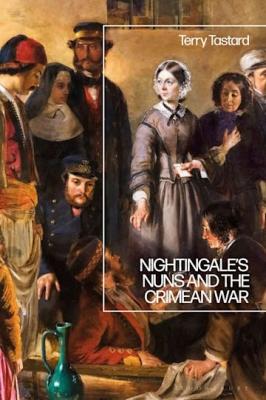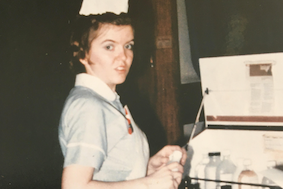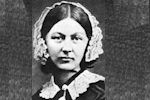Nightingale's Nuns and the Crimean War

The story of the religious sisters who worked alongside Florence Nightingale during the Crimean War has largely been left out of our historical memory. In this fascinating new book, Fr Terry Tastard documents their time in the Crimean War and shows their importance in the development of nursing and the role of women in society.
Fr Terry gave the following interview with BBC journalist Lorna Donlan at the launch of the book last Tuesday at Holy Trinity Parish Centre, Brook Green.
Lorna Donlan: The first thing I would ask is how did this book come about?
Fr Terry Tastard: A long time ago, when I was in a previous incarnation as an Anglican, I heard about the Anglican nuns who worked with Nightingale and I was fascinated. Then I discovered there were obviously Catholic ones too and I wonder if there was was some kind of ecumenism at that time before the word was invented. Did they get on together? Did they work together? Were they in some way an example? The answer was not really.
There's a poignant scene I record where one of the Anglican nuns can't go back to her quarters because she's been stowed in with the Catholic nuns. She's in the same convent with them and she hears the last Office of the day. It's a relatively unvarying Office. And she knows it off by heart and she's dying to join in with them. But she can't. Because of course the Catholic Church didn't allow prayer in common in those days. Later on, the same nun is under a Catholic sister as hospital superintendent and she feels uncomfortable because she feels the Catholics themselves are subservient to a foreign power. Ie the Vatican.
Lorna: This is a story about those nuns and primarily in 19th century Victorian Britain. What was the standing of those nuns? How were they viewed at that time in society?
Fr Terry: The bulk of the population in England had very little contact of experience of nuns. And of course they came over in large numbers during the French Revolution and often met with a good welcome but when there was a big change in the religious life and it became much more associated with sisters working in ministries - what we would call the apostolic life - the sight of nuns on the streets - was different - most congregations had stories about how in the early days the sisters were stoned in the streets. And of top of that they had a great struggle to be recognised as able to own property in their own right. The law of the land didn't allow that at that time. But on the other hand the Catholic Church itself rapidly saw in the sisters a wonderful resource and every bishop wanted to have them in his dioceses.
Lorna: The Army at this time would have had its own medical division. Why was in necessary in the first place for people like Florence Nightingale in a different way Mary Seacole, to have to go to the Crimean war?
Fr Terry: I was hoping you'd ask that question so I've brought the statistics. They are quite startling and I wanted to get it right. The Crimean War lasted about two and a bit years. And the UK put into the field over that period over 90,000 troops. Now of those, 17,580 - that's 18 per cent, died of disease. 4,602 died in action, that's 4.5 per cent. And even some of those who died in action actually died of injuries that could have been taken care of on the battlefield or shortly afterwards - they died of lack of nursing care. So when the public became aware, through the newspapers, or this terrible mortality and the fact that soldiers were more likely to die in hospital than on the battlefield there was a massive outcry.
Lorna: You mentioned the public and newspapers there. That's something else that was new wasn't it? The public had a very different perception of this European war compared to previous encounters, What was the reason for that?
Fr Terry: It was the age of the beginning of mass newspaper circulation and they could get reports from Constantinople to London in between eight and 12 days. There was an electric telegraph line set up but that was only for military use. On top of that there were very skilled artists who could do engravings that could be reproduced in newspapers - showing battle scenes or the aftermath of battle scenes that they witnessed themselves. Roger Fenton was a pioneer photographer and he also took photographs - so combined with mass circulation, the spread of railways allowed the newspapers to circulate much more widely, instantly, throughout the country and the illustrations. This all made the public feel much more identified with this war. So this was the first war really in which there was mass publicity and a sense of involvement in a direct way that wasn't hitherto possible.
Lorna: For the Anglican and Catholic sisters this was about their vocation, it was about commitment to care but the stakes were much higher than that really - if `I use a modern word - there quite a lot of 'spin' around their story?
Fr Terry: Absolutely. I laugh at a little detail the Irish sisters under Mother Frances Bridgeman left from Dun Laoghaire it was called something different then - Kingstown - there was a massive crowd and the men all lifted their hats and shouted 'Godspeed.' And so there was a sense of them representing Ireland. The English nuns had a much much lower profile. But the Bishop of Southwark, who was the organising person for the English nuns had a very clear picture that this would be good - as we say these days - 'public relations'. And he made that perfectly clear as did the future Cardinal Manning. At that point he was the Provost of the Cathedral not a bishop yet but very much a prominent personality. And he wrote to the sisters along with Archbishop Cullen who said the same thing he said: "If you do well it will bring a wonderful glow to the reputation of the Catholic Church in these islands'".
Lorna: It was also significant for the Anglican sisters?
Fr Terry: The Anglican sisters had o only been in existence for about nine years and they were still very small in number. So about half of their number went out to the Crimea - which was quite extraordianriy when you think of it. And of course they came out of the Anglo Catholic world - it wasn't quite called Ang'o Catholic then - High Church or Tractarian Movement which sought to restore the religious life of England. There was a lot of opposition because they were seen as an advance guard - as it were Roman Catholic Fifth Columnists - termites ticking away at the Church from the inside. So they really had to on the one hand be faithful Anglicans and on the other hand they had to show that they could live religious life even under the tremendous pressures and strains of a war experience.
Lorna: One of the central themes in this book is the relationship between Florence Nightingale and and the leader of the Irish nuns Mother Frances Bridgman. They were very very different women. Briefly - where was Florence Nightingale at that point in her public career so to speak? And can you tell us a bit about Frances Bridgeman?
Fr Terry: Of course. Florence Nightingale in fact had been on the brink of being received into the Catholic Church. Partly out of her own search for a vocation. Her parents as you know obstructed or delayed her desired to train in nursing. And she saw in the religious life - particularly in the Sisters of Charity and their nursing work - she saw a vocation for herself. And she more or less directly asked Manning to receive her. But she was a very well educated and well read woman. Better than the vast majority of men at the time . She could read Hebrew. Her Greek was excellent She knew `French, German and Italian as well. But she was also very well read in philosophy and the current questions of the day. And I think Manning found in her someone who questioned too much. And was too broad minded for him to feel comfortable with receiving her into the Church. In fact she wrote to him saying: "You accuse me of being eclectic." And I think that summed it up very well. So there she was, having been on the brink of becoming a Catholic. A short time later later on the way to Crimea, and she goes out with the English sisters. And unexpectedly, just before Christmas, the Irish sister turn up with Mother Frances Bridgman. Now you said she was very different but I think actually the problem was, they were very similar. They were both strong characters They were both excellent leaders. They were both people who didn't bend easily to the will of others. And it could only lead to an explosion because - believe it or not when Frances Bridgman arrived with her sisters on a ship, in the Golden Horn, opposite Constantinople, Nightingale sent a message down saying: "I didn't ask for you. I don't want you. I don't have a place for you." The shock for the Irish sisters was tremendous.
Lorna: I'lll get back to that relationship later, but I'd like to ask first, when Nightingale and her group arrived in November what kind of conditions were they confronted by? Also how were they received by the army, by the people running hospitals there?
Fr Terry: When they arrived there was virtually no provision for them. They were sent up a tower - because the hospital had towers at each corner. They had a room with broken panes of glass. It was freezing cold. There was no food for them - the solders actually had to pool their rations to feed them. It was bitterly cold. They also got a bitterly cold reception from the medical staff, because the medical staff felt that the presence of the nurses as a whole - because there were also other nurses who were not nuns - all the nurses - were an implicit criticism of the doctors. And the doctors felt there were being made - as we would say now - the 'fall guys' for the problem with supplies. The supplies were a major problem that led to poor medical conditions in the hospital. They felt all the publicity had put them in a bad light and the presence of the nurses, including the nuns was a rebuke to them. On top of that of course, women were simply never present - ever - in a military hospital. And so there was tremendous fear of romantic relationships or worse. Or women fainting at the sight of blood. That was the kind of fear that greeted them
Lorna: And what were they confronted by in those hospitals?
Fr Terry: They were confront initially by people who had been injured at the Battle of Inkerman. Of course one of the primary treatments for a shattered limb was amputation. So they were dealing with men who sometimes had had a limb amputated on the battlefield . Sometimes they were taken by ship across the Black Sea and limb amputated in the hospital. There were a huge number of amputations. In fact Sister Gonzaga Barry who was the number two of the English Sisters and very much a favourites of Florence Nightingale , treated over 200 stumps in her first few days in the hospital. When Nightingale arrived, there were two things she tried to change right away: One was there clumps of excrement in the wards - she had them removed, and secondly, operations were taking place in the wards in the full view of the military patients. So she tried to arrange for screens at least to screen off the amputations taking place. Nevertheless, nuns occasionally would have to urgently attend to a patient here and witness an amputation there. On top of that, infestation with lice and fleas was rampant. Before they went to bed each evening they had to send hours de-lousing themselves.
Lorna: The clash between Bridgeman and Nightingale was so stark and it's very vividly portrayed in the books through some of the extracts you show and you also make it clear neither was a particularly easy woman in many respects. But was it more than just a clash of personalities?
Fr Terry: I think in some ways Nightingale felt that she represented England and Bridgman felt that she represented Ireland. There were echoes of an ancient clash there. Although I suspect if you put it to them, each would have denied it vociferously .
Lorna: Although they weren't able to work together in the same hospital?
Terry: They couldn't work together. In fact a small group of the Irish sisters did work in Scutari, but not directly under Nightingale . Bridgeman then negotiated for half a hospital on the coast. Which she took charge of with her sisters. Then later on when that hospital closed, because hospitals had been opened finally in the Crimea intensely - Bridgman negotiated to have a general hospital in Balaclava where she and her sisters would be exclusively in charge of the nursing. And that simply lit the fuse of Florence Nightingale. She was infuriated that she had been out-maneuvered by this Irish woman. She wrote a series of angry letters to the War Office back in London . Lord Panier - the war minister was exhausted by all this. But eventually what happen was Nightingale managed - late in the day - which was quite interesting - only a couple of months before the Armistice to get the War Office to say she was in charge of allocating nurses and she alone. She sped off to balaclava, Asked Mother Bridgman to remain in post - under her authority - Bridgman refused. - and went out - with her sisters.
Lorna: One of the other striking things in the book is the plight of the ordinary soldiers in this war. The terrible conditions in which they fought and also the terrible condition they endured before getting help if they had been wounded.
Fr Terry: yes I think we need to add here that there was a particular disaster. There was a ship called the Prince, which was full of winter uniforms, and boots. There was a terrible storm on the 14 November and Prince sank with all nods and its cargo - in sight of Balaclava harbour. About a dozen other ships were sunk as well A terrible disaster. And so the men were totally un equipped for a Russian winter. - you know what it did to Napoleon. You can imagine what it did to the British and French forces they were exposed to frostbite on a terrible scale . This again led to a cycle of necrotising flesh, gangrene and amputations. Supplies of food were very low. Fodder for the horses could not be had. The horses were dying. Series were sent out and actually froze to death t their posts. Some of the men would charcoal heaters in their tents and would die from the fumes when there wasn't proper ventilation.
The other thing to be said was that the quality of officer leadership varied enormously. Particularly with regiments with strong regional ties, the leadership might be good and officers solicitous. But many officers had actually bought their commissions and were able to resign it almost at will - which quite surprised me. Some officers, encountering the hardship simply resigned and went back to the UK leaving the men exposed to particularly badly organised army. Badly organised from the point of view of supplies. The purveyors organises organised layers of forms. They operated in committees. And there was no sense of urgency. One thing which came up when there was an investigation of the supplies was was that they would sometimes tell Florence Nightingale that what she asked for was not in the stores - and they were. And sometimes they would say things couldn't be bought locally and she would go out and buy them herself.
Lorna: One of other things you depict in the book is that we were looking at two women with two very different ideas or visions of what nursing was or should be - in that very early stage of the professionalisation of nurse. Ans secondly the role of religion was very contentious
Fr Terry: Hugely contentious. When the nuns went out, it was partly in response to letters in the Times where people being away of the state of healthcare for the soldiers said the French have Sisters of Charity who follow their armies - which was true. And they care for the wounded. Why have we not got that? So on the one hand there was a public outcry wanting nuns to go out, but on the other hand large sections of the public were afraid that these nuns would work on the minds of men who were at their most vulnerable and bring them over to Rome. There was a lot of ambivalence really about the nuns who nursed. But another factor was different concept of nursing . Nightingale really wanted it on a scientific basis - in the middle of this she careful compiled statistics what numbers of men died, what they died of and so on. Morbidity rates. What brought them back. She wanted nursing to be scientific and based on what was observably good practice. . The Irish nuns also had done their best to follow what was best practice in nursing but they had a much more spiritual view and sometime adopted a rather sentimental caring approach as something which would carry men through a difficult time physically. As part of that they very much wanted to care for their own. A large proportion of the army was Irish. Between 30 - 40 per cent. So they felt a felt a natural affinity to Irish soldiers, mostly Catholic - and so brought in religion as well was a source of comfort. However - there were conversions in hospitals run by the Irish sisters. And that aroused a lot of antagonism.
Lorna: Once the war ended and the nuns returned home, how were they received in Britain and in Ireland?
Fr Terry: It's extraordinary. The English sisters went back into anonymity almost. They were known to Henry Manning, to the hierarchy but publicly there was not much acknowledgment or awareness. The reputation and name of Nightingale soared over everybody else. When the Irish Sisters went back, there was a lot of publicity about their return . They came from four or five different convents in Ireland and often their arrived was signalled in advance and there were parties to greet them and bonfires . A sense of rejoicing and a sense of pride at what their sister had done. But at the same time there was an acute awareness in Ireland that Nightingale grabbed all the credit and that their sisters had been neglected,
Lorna: You quote someone in the book saying that Nightingale afterwards monopoles the public imagination. Do you think that really was the case?
Fr Terry: Im convinced it was the case.
Lorna: It could also be argued in terms of that very iconic picture of her - with the lamp in the ward in a sense created a new kind of heroic image of war - a more more caring aspect of war, do you think?
Fr Terry: I do. There was also the class aspect. One author I read was very thought - provoking. I can tell from letters I've read in the Times especially .. but there were many letters saying: 'The army os led by aristocrats,. Its led by old men, led by people who are out of touch with reality Its being led by people who are stuck in the past. Who are still fighting the Peninsular War against Napoleon. There was a sense of a new middle class criticising the aristocratic monopoly of military leadership and Nightingale as she ultimately admitted was a perfect example of someone who could be a hero figure and someone who at the same time voiced criticism not just of the military but other aspect of the country that were stuck, in the eyes of the middle class.
Lorna: Finally, in a sense, is it a story of a consult within a conflict? What was achieved? What did the women achieve?
Fr Terry: They saved lived. They save many many lives. But they also brought a sense of the involvement of the public. They represented a greater part of England caring for the soldiers. On top of that, they learnt skills under pressure that were brought back to England to St Thomas Hospital where Nightingale set up the first professional in-hospital l nurse training programme.
Nightingale's Nuns and the Crimean War by Terry Tastard is published by Bloomsbury Academic


















